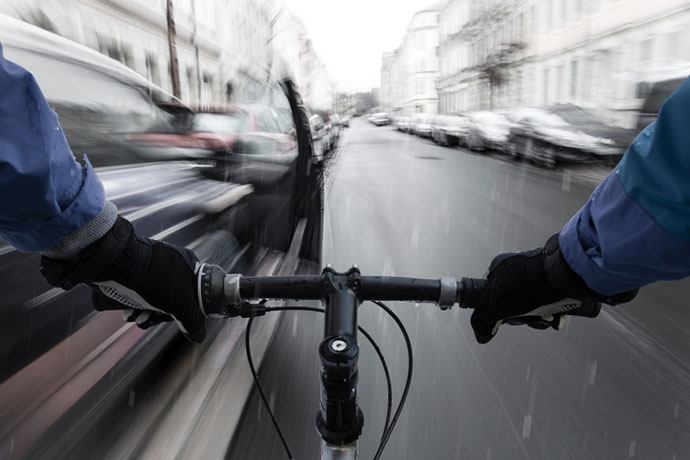
The pros and cons of introducing presumed liability to protect vulnerable road users are to be researched by the government.
Presumed liability makes motorists financially liable for collisions with pedestrians or cyclists. Only when the pedestrian or cyclist is proved to be negligent does the driver avoid paying compensation through their insurance. The principle recognises that the drivers of faster, heavier vehicles have a duty of care, and that if a pedestrian or cyclist is injured in a road traffic collision, injuries or shock may make it difficult for them to accurately recollect the event.

At the moment, there are only four other countries in Europe that have yet to introduce the concept of presumed liability to their legal systems: Malta, Cyprus, Romania and Ireland.
According to the campaign group Roadshare, “Presumed liability in civil law is the proper approach for a mature, socially conscious nation as it addresses the unacceptable human cost of the current system. Under presumed liability, injured vulnerable road users are properly and promptly cared for and not forced to fight for compensation.”

The Times covered the campaign for presumed liability back in 2015
At present, motor insurers routinely argue for reductions in compensation to vulnerable road users injured in road traffic collisions, even in the face of evidence that their customers are at fault.
Even cities in the home of the car are making law to protect cyclists. Los Angeles city council is one of a number of American cities to being in new laws to protect cyclists against harassment by motorists. Such laws discourage dangerous behaviour toward cyclists and provide another tool with which to prosecute offending drivers.
A spokesperson for the Environmental Transport Association said: “Presumed liability is not a panacea, but if Britain is serious about promoting cycling then it’s vital we fall in line with the majority of other European countries.”
Ethical cycle insurance
Check your small print for so-called ‘new-for-old’ replacement – many insurers use the term, but if your bicycle is more than a few years old, they devalue it severely. This means you are left out of pocket when you come to replace it.
With ETA cycle insurance, however old the bike, if it’s stolen you get enough to buy a new model. Furthermore, every cycle insurance policy you buy from us helps support the work of the ETA Trust, our charity campaigning for a cleaner, safer transport future. No wonder The Good Shopping Guide judges us to be ethical in Britain.
Philip Nalpanis
As a cyclist and motorist I have seen too many cyclists cycling at night without lights and wearing dark clothing to support this. What level of proof would be required to prove the cyclist’s liability in a case where such a cyclist was involved in an accident?
Chris
So already you are looking for reasons to blame the victim!
Howard cheesman
While I agree with the previous comment, presumed liability would be a start in trying to change the mindset of motorists to bikes on the roads. Try riding in the Netherlands for example, and notice how more consideratly you are treated and how much safer you feel!
Joel
Philip. I think it is reasonable to expect cyclists to have lights but probably not having to wear high visibility clothing. It is all about where do we draw the line. We all agree it is a step too far to have lights, hi-vis jackets and helmets for pedestrians but what is acceptable for runners? As well as walking cycling and driving I also have a moped, there are no hi viz requirements, should there be?
Philip
Speaking also as a cyclist and motorist, Philip makes a perfectly valid point.
We have become a nation of “victims” looking for somebody else to blame, and sadly too many cyclists do not take the necessary precautions for their own safety. Classifying all cyclists involved in RTA’s as victims undermines the entire argument and hinders, rather than enhances, progress to protect vulnerable road users.
Fergus Duncanson
The key point is that drivers of cars and other vehicles should be carrying the responsibility for the consequences of driving 2-ton lethal boxes; it’s not about ‘blame’, simply about carrying responsibility towards more vulnerable road users. The odd case where cyclists are irresponsibly and illegally cycling unlit in darkness should be clear-cut in terms of the evidence, in the event of an accident. The worry about that doesn’t, for me, detract from the value of Presumed Liability; and if it’s a good thing for almost all Europe then it will be good thing for us too.
Rob
Also a cyclist and driver, surely as responsible road users we should focus on the damage that can be inflicted by a vehicle on a pedestrian or cyclist due to bad driving, not simply when it is dark. I have seen too many examples where pedestrian or cycling victims have been severely injured or killed due to careless driving. Even in the case of convictions, the compensation comes nowhere near the levels it should be to mitigate the life-changing injuries sustained.
matt
This article is good news – but does ETA have an actual announcement from someone in government that this is happening? There is a frustrating lack of detail here!
The ETA
DfT quoted in Local Transport Today (14 December – 4 January 2019): “We intend to work together with the Ministry of Justice to commission research to understand the advantages of a change in liability rules. We will discuss with the Scottish government whether they wish to research the likely impact of changes to Scots law too.”
matt
Great, thanks!